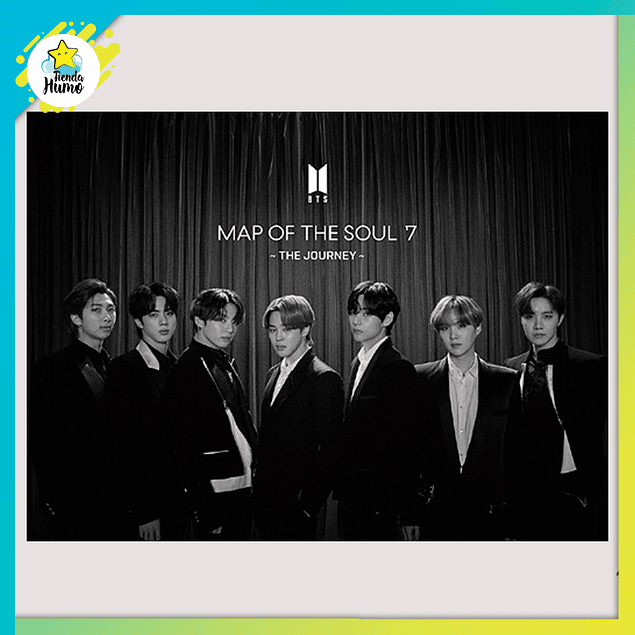The Journey of Self-Discovery: Deconstructing BTS’s "Map of the Soul"
Related Articles: The Journey of Self-Discovery: Deconstructing BTS’s "Map of the Soul"
Introduction
In this auspicious occasion, we are delighted to delve into the intriguing topic related to The Journey of Self-Discovery: Deconstructing BTS’s "Map of the Soul". Let’s weave interesting information and offer fresh perspectives to the readers.
Table of Content
The Journey of Self-Discovery: Deconstructing BTS’s "Map of the Soul"

The "Map of the Soul" series, a defining chapter in BTS’s musical journey, transcended the boundaries of K-pop, captivating global audiences with its profound exploration of self-identity, psychological depth, and the universal human experience. This article delves into the intricate tapestry of the "Map of the Soul" era, dissecting its themes, artistic evolution, and enduring impact on the music industry and beyond.
A Foundation Laid in Jungian Psychology:
The "Map of the Soul" series draws inspiration from Carl Jung’s analytical psychology, particularly his concept of the "persona," the social mask we present to the world, and the "shadow," the repressed aspects of our personality. This framework provides a lens through which to examine the complexities of self-discovery, the struggle for authenticity, and the acceptance of one’s multifaceted nature.
"Persona" – Embracing the Public Image:
The album "Persona" marks the beginning of this introspective journey. The title track, "Persona," serves as a powerful declaration of self-awareness, acknowledging the public image and the pressure to conform. The album explores themes of identity construction, navigating societal expectations, and the struggle between individuality and conformity. Tracks like "Intro: Persona" and "Jamais Vu" delve into the complexities of self-perception and the interplay between the persona and the inner self.
"Shadow" – Confronting the Darker Side:
"Shadow" takes a darker turn, confronting the hidden aspects of the self. The title track, "Shadow," is a raw and vulnerable exploration of fear, insecurity, and the shadows that lurk within. The album delves into themes of self-doubt, the fear of vulnerability, and the struggle to reconcile the light and dark within. Tracks like "Black Swan" and "Outro: Ego" confront the shadows head-on, grappling with self-acceptance and the acceptance of one’s imperfections.
"Ego" – Finding Balance and Acceptance:
"Ego" completes the trilogy, marking a shift towards self-acceptance and the integration of all aspects of the self. The title track, "Ego," celebrates individuality and self-love, emphasizing the importance of embracing both the light and the dark within. The album delves into themes of self-empowerment, resilience, and the journey towards self-actualization. Tracks like "Interlude: Shadow" and "Outro: Ego" showcase the growth and transformation achieved through the process of self-discovery.
Beyond the Trilogy: "BE" and the Power of Connection:
While the "Map of the Soul" trilogy focused on individual journeys of self-discovery, "BE" shifted the focus to the power of connection and collective resilience. The album, released amidst the COVID-19 pandemic, reflected the shared experiences of isolation and uncertainty, emphasizing the importance of human connection and finding solace in shared vulnerability. Tracks like "Life Goes On" and "Dis-ease" capture the emotional complexities of a world grappling with unprecedented challenges.
The Impact and Legacy of "Map of the Soul":
The "Map of the Soul" series has had a profound impact on both the music industry and its global fanbase. It has pushed the boundaries of K-pop, showcasing the group’s artistic maturity and their ability to engage with complex themes. The series has also resonated with audiences worldwide, providing a platform for self-reflection and fostering a sense of community through shared experiences.
FAQs about BTS’s "Map of the Soul":
Q: What is the significance of the "Map of the Soul" series?
A: The "Map of the Soul" series is significant for its exploration of self-identity, Jungian psychology, and the universal human experience. It marked a departure from previous themes, showcasing the group’s artistic growth and their ability to engage with complex concepts.
Q: How does Jungian psychology influence the "Map of the Soul" series?
A: Jungian psychology, particularly the concepts of the "persona" and the "shadow," provide a framework for understanding the complexities of self-discovery and the internal conflicts we face. The series explores these concepts through its lyrics, music videos, and overall narrative.
Q: What are the key themes explored in the "Map of the Soul" series?
A: The series explores themes of self-identity, self-acceptance, the struggle for authenticity, navigating societal expectations, confronting the darker aspects of the self, and the power of connection.
Q: How has the "Map of the Soul" series impacted BTS’s career?
A: The series has solidified BTS’s position as a global force in music, showcasing their artistic maturity and their ability to engage with complex themes. It has also expanded their fanbase, resonating with audiences worldwide.
Tips for Understanding and Appreciating "Map of the Soul":
- Explore Jungian Psychology: Familiarize yourself with basic Jungian concepts like the "persona," the "shadow," and the "self."
- Pay Attention to Lyrics: The lyrics in the "Map of the Soul" series are rich with symbolism and meaning. Take the time to analyze them and understand their deeper implications.
- Analyze Music Videos: The music videos for the "Map of the Soul" series are visually stunning and often contain hidden meanings. Pay attention to symbolism, imagery, and narrative.
- Engage with the Fan Community: Connect with other fans and discuss your interpretations of the series. This can provide valuable insights and perspectives.
Conclusion:
BTS’s "Map of the Soul" series is a testament to the group’s artistic evolution, their ability to engage with complex themes, and their impact on the global music landscape. It serves as a powerful reminder of the universal human experience, offering a space for self-reflection and fostering a sense of community through shared experiences. The series’ legacy will continue to resonate with audiences worldwide, inspiring self-discovery and fostering a deeper understanding of the complexities of the human psyche.
![[BTS] อัลบั้ม『MAP OF THE SOUL : 7 ~ THE JOURNEY ~』ได้รับการรับรองยอดขาย](https://f.ptcdn.info/329/077/000/rc6qswfhxCOeW2nus46-o.jpg)






Closure
Thus, we hope this article has provided valuable insights into The Journey of Self-Discovery: Deconstructing BTS’s "Map of the Soul". We thank you for taking the time to read this article. See you in our next article!